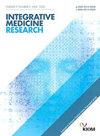针灸与认知行为疗法治疗失眠癌症幸存者的焦虑:一项随机临床试验的探索性分析
IF 3
4区 医学
Q2 INTEGRATIVE & COMPLEMENTARY MEDICINE
引用次数: 0
摘要
背景:焦虑和失眠经常在癌症幸存者中同时发生,并且它们之间有着紧密的联系,但目前还没有广泛接受的干预措施同时针对这两种症状。方法数据来自一项双中心、平行组、随机、比较疗效的试验,评估针刺与CBT-I治疗失眠的疗效。76名基线医院焦虑和抑郁量表-焦虑(HADS-A)评分≥8分的参与者被纳入研究。两种干预措施均在8周内实施,随访至20周。在基线、第8周和第20周使用HADS-A评估焦虑。采用线性混合效应模型检验HADS-A评分的平均变化。此外,还进行了应答者分析,失眠和焦虑应答者定义为在第8周时任一结果均有临床意义改善的患者。结果与基线相比,CBT-I和针灸在第8周(CBT-I: -3.75;针灸:-3.14)和第20周(CBT-I: -3.05;针灸:-2.66)均显著降低了HADS-A评分(均p <; 0.001)。组间差异无统计学意义(p=0.85)。在应答者分析中,CBT-I显示,在两个时间点(第8周:p=0.0046;第20周:p=0.038),失眠应答者的焦虑减少(-4.62)比无应答者(-0.45)更大。在针灸组中,失眠反应者(-3.96)和无反应者(-1.58)之间焦虑减少的差异无统计学意义。结论针刺和CBT-I均能有效控制癌症幸存者的共病焦虑和失眠。针灸可以单独解决这些症状,而CBT-I可以通过相互关联的方式改善它们。临床试验注册(NCT02356575)。本文章由计算机程序翻译,如有差异,请以英文原文为准。
Acupuncture versus cognitive behavioral therapy for anxiety among cancer survivors with insomnia: An exploratory analysis of a randomized clinical trial
Background
Anxiety and insomnia frequently co-occur among cancer survivors and are strongly interconnected, yet no widely accepted intervention simultaneously targets both symptoms.
Methods
Data were drawn from a dual-center, parallel-group, randomized, comparative effectiveness trial evaluating acupuncture versus CBT-I for insomnia. Seventy-six participants with baseline Hospital Anxiety and Depression Scale-Anxiety (HADS-A) scores of ≥8 were included. Both interventions were administered over eight weeks, with follow-up until 20 weeks. Anxiety was assessed at baseline, week 8, and week 20 using HADS-A. A linear mixed-effects model was used to examine mean change in HADS-A scores. Additionally, responder analyses were conducted, with insomnia and anxiety responders defined as patients demonstrating clinically meaningful improvements in either outcome by week 8.
Results
Both CBT-I and acupuncture significantly reduced HADS-A scores at week 8 (CBT-I: -3.75; acupuncture: -3.14) and week 20 (CBT-I: -3.05; acupuncture: -2.66) compared to baseline (all p < 0.001). There was no between-group difference (p=0.85). In responder analyses, CBT-I showed greater anxiety reduction in insomnia responders (-4.62) than non-responders (-0.45), at both time points (week 8: p=0.0046; week 20: p=0.038). In the acupuncture group, the difference in anxiety reduction between insomnia responders (-3.96) and non-responders (-1.58) was not statistically significant.
Conclusion
Both acupuncture and CBT-I effectively manage comorbid anxiety and insomnia in cancer survivors. Acupuncture may address these symptoms independently, while CBT-I may improve them in an interconnected manner.
Trial registration
ClinicalTrials.gov registration (NCT02356575).
求助全文
通过发布文献求助,成功后即可免费获取论文全文。
去求助
来源期刊

Integrative Medicine Research
Medicine-Complementary and Alternative Medicine
CiteScore
6.50
自引率
2.90%
发文量
65
审稿时长
12 weeks
期刊介绍:
Integrative Medicine Research (IMR) is a quarterly, peer-reviewed journal focused on scientific research for integrative medicine including traditional medicine (emphasis on acupuncture and herbal medicine), complementary and alternative medicine, and systems medicine. The journal includes papers on basic research, clinical research, methodology, theory, computational analysis and modelling, topical reviews, medical history, education and policy based on physiology, pathology, diagnosis and the systems approach in the field of integrative medicine.
 求助内容:
求助内容: 应助结果提醒方式:
应助结果提醒方式:


